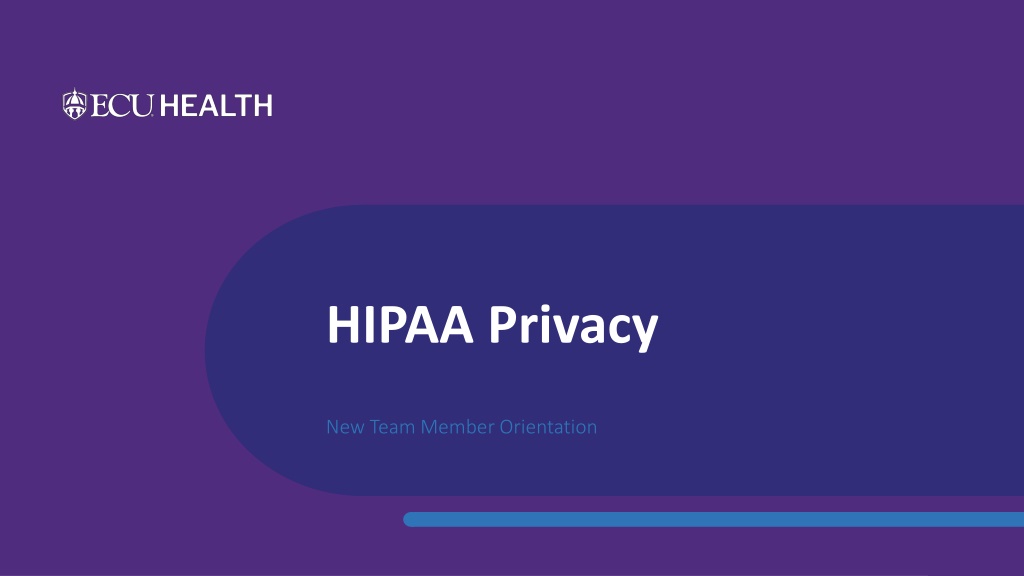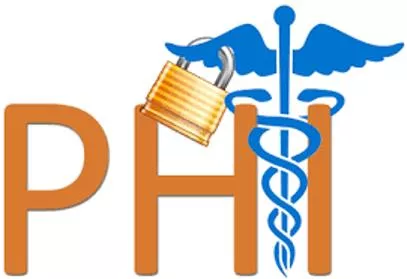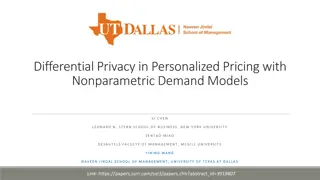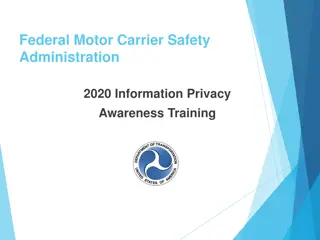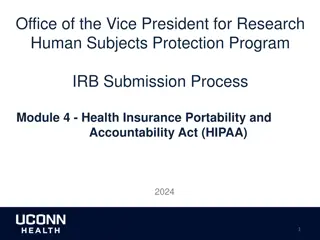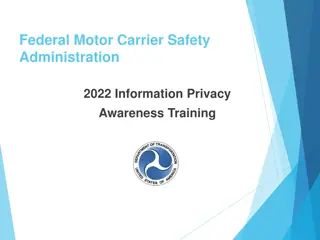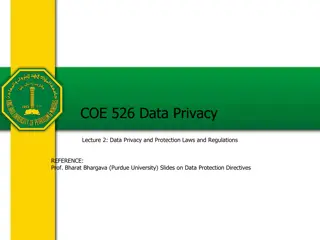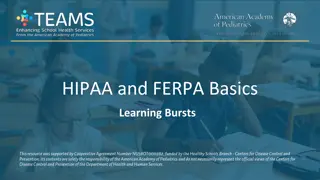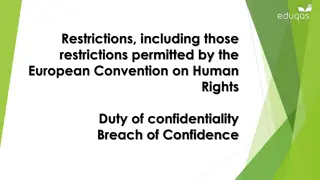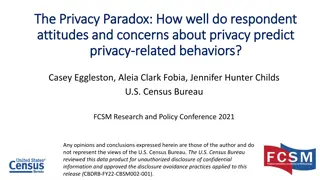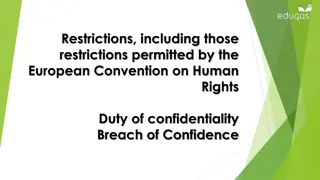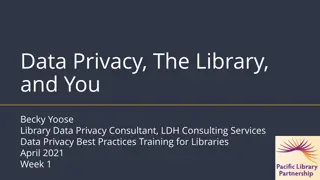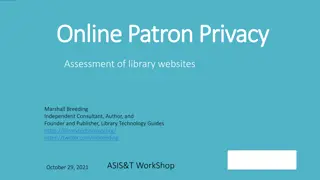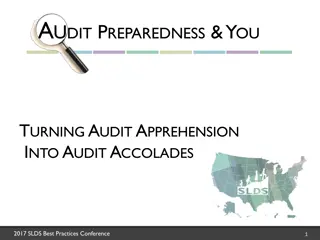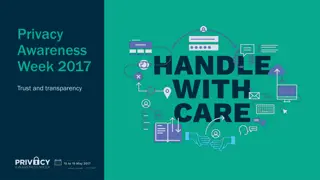HIPAA Privacy
The Health Insurance Portability and Accountability Act (HIPAA) is crucial federal legislation that safeguards the privacy and security of health data, known as Protected Health Information (PHI). This orientation material explores what PHI entails, including examples and elements, as well as patient rights under HIPAA. It emphasizes the importance of maintaining confidentiality and complying with regulations to protect patients' sensitive information.
Download Presentation

Please find below an Image/Link to download the presentation.
The content on the website is provided AS IS for your information and personal use only. It may not be sold, licensed, or shared on other websites without obtaining consent from the author.If you encounter any issues during the download, it is possible that the publisher has removed the file from their server.
You are allowed to download the files provided on this website for personal or commercial use, subject to the condition that they are used lawfully. All files are the property of their respective owners.
The content on the website is provided AS IS for your information and personal use only. It may not be sold, licensed, or shared on other websites without obtaining consent from the author.
E N D
Presentation Transcript
HIPAA Privacy New Team Member Orientation
HIPAA Background oThe Health Insurance Portability and Accountability Act (HIPAA) is federal legislation that addresses issues ranging from health insurance coverage to standard identifiers for healthcare providers We ve all heard it, but what does it really mean We ve all heard it, but what does it really mean - - oFor our purposes, we deal with the portions of the law that speak to protecting the privacy and security of health data, which HIPAA refers to as Protected Health Information or PHI 2
What is Protected Health Information - PHI? PHI is ANY information, transmitted or maintained in any medium (written, electronic, verbal) including demographic data that is Examples Written documentation/paper records Spoken and verbal information, including voice mail messages Electronic databases and any electronic information including -Research information -PHI stored on a computer, smart phone, memory card, USB drive, etc. Photographic images Audio and Video recordings Created/received by a covered entity or business associate Relates to/describes past, present or future physical or mental health or condition; or past, present or future payment for healthcare; and Can be used to identify the patient 3
Elements of Protected Health Information Names Demographic subdivisions smaller than the state (Street address, city, county, zip code) Dates of Birth, death, admission, treatment, discharge Phone numbers and Fax numbers E-mail address, IP Address, URLs Social Security Number Medical record number, account number, health plan beneficiary numbers Full face photographic images and any comparable images Certificate/license numbers Vehicle identifiers (VIN) and serial numbers including license plates Device identifiers and serial numbers Biometric identifiers, including finger and voice prints Any other unique identifying numbers, characteristic, or code 4
Patient Rights under HIPAA Patients are provided a Notice of Privacy Practice Patients may request: o An accounting of disclosures of PHI o An amendment to their medical record o Confidential and/or Alternative communications of PHI o Further Restrictions of PHI o Amendment of PHI o File a complaint regarding a potential privacy concern If you are presented with any of these situations, please contact the ECU Health Privacy office at (252) 847-6545 or ecuh_privacy@ecuhealth.org for assistance! 5
How can PHI be used? An authorization from the patient is NOT required when PHI is used for Treatment (T) Payment (P) Healthcare Operations (O), such as quality improvement, credentialing, compliance, patient safety You may hear this referred to as TPO 6
HIPAA Authorization oOutside of TPO (Treatment, Payment, Healthcare Operations), a signed HIPAA Authorization is required for any other use or disclosure oThe authorization must be in writing and include specific elements oPatient must receive a copy and may revoke an authorization in writing in certain situations oResearch is not considered health care operations oExamples of when an authorization is required Patient s request to release PHI to an outside entity or individual Release of employment-related examination information Psychotherapy notes and other sensitive conditions Certain fundraising or marketing activities 7
What is a BREACH? The unauthorized acquisition, access, use, or disclosure of PHI which compromises the security or privacy of the information We are required to notify the affected individual (or next of kin) without unreasonable delay, but not later than 60 days from discovering the breach We are also required to report breaches to the NC DHHS If the breach involves 500 or more individuals -Notification to individuals -Notification to DHHS -Published in news media It is imperative that breaches of PHI are reported immediately!! 8
What puts us at risk for a BREACH Enemy #1 PAPER Discharge paperwork, After Visit Summary or prescriptions given to wrong patient. Unsecure records Protected health information dropped in hallway, cafeteria, parking lot, etc. Improper Disposal Placing protected health information in trash instead of shred box. 9
What puts us at risk for a BREACH Searching Using Epic to find information like a phone number, address, date of birth, or room number for an individual such as a co-worker, family member, neighbor, friend, etc. for personal reasons. Also, not locking computer workstation, you will be held responsible for access under YOUR credentials! REMEMBER Epic is not Google!!! REMEMBER Epic is not Google!!! 10
Accessing EPIC Do s: Only access medical records for which you have a job reason to do so Don ts: Accessing your own medical record or the medical records of family members through the Electronic Health Record (EPIC) - To access your own medical record, you must use MyChart - To access a family member s chart, that family member must give you permission and provide you with the log-in credentials to access the family member s MyChart Inappropriate access into the medical record is a HIPAA Violation and can Inappropriate access into the medical record is a HIPAA Violation and can result in corrective action result in corrective action 11
Access ONLY what you need to do your job! It s as simple as that. If you can do your JOB without it, don t access it. 12
Protenus o ECU Health uses a tool called Protenus to identify potentially inappropriate accesses to the electronic health record Protenus looks at EACH and EVERY access to the electronic health record Identifies potential inappropriate accesses - Co-workers - Family Members - People in the news media 13
What puts us at risk for a BREACH Release of Information Discussing protected health information to visitors without patient consent. Loose Talk Telling others about patient diagnosis, treatment plan, etc. Avoid conversations involving PHI in public or common areas such as hallways, elevators, cafeterias, etc. 14
What puts us at risk for a BREACH Misdirected Faxes VERIFY the recipients fax number and CONFIRM you dialed the correct number SELECT the correct ordering provider to receive results Lost and Stolen Devices Portable devices with PHI left in unsecure areas such as the cafeteria, bathroom or your unlocked car IT has implemented security measures to reduce the loss of PHI on personal phones, if your device is lost, contact IT for assistance with removing the PHI 15
What puts us at risk for a BREACH Unencrypted Data Emails containing PHI should be encrypted using [secure] in the subject line of the email 16
What puts us at risk for a BREACH Contacting Patients Make every effort to speak to the patient directly Never leave voice messages containing information regarding condition, test results, specifics about treatment, etc. If you must leave a message, leave your name, ECU Health, and your phone number only not specific department, office location Do not state the reason for the call 17
What puts us at risk for a BREACH Social Media Post/comment/message/picture about a specific patient Any image of a patient shared where they could be identified Responding to comments and including any identifiers of PHI Sharing PHI in ANY social forum without patient s consent - in private groups as well Recognition that someone is a patient ( It was nice to see you the other day, or Glad you enjoyed your visit. )
Social Media . Bottom line No form of PHI is to be shared on social media without authorization If you don t know if posting something might be a HIPAA violation, DON T post it! 19
HIPAA and Photos What pictures qualify as PHI? Any photo that shows individually identifiable information of a patient is considered PHI -Patient s face, name or initials, their date of birth, the date of their treatment or -Photos of birthmarks, moles or tattoos, and other identifying features High profile patients with specific injury (shark bite wounds)
HIPAA and Photos Storage Photos containing PHI should not be stored on any device for an indefinite amount of time and all devices should be wiped of PHI photos before it ever leaves the office Communications With photos containing PHI, team members and providers must be careful to never email, text or otherwise send without proper encryption software -Cortext and Haiku
Violations, Sanctions, Penalties oIndividuals under the purview of ECU Health who do not follow HIPAA rules are subject to corrective action oThe level of corrective action is dependent upon the severity of the violation, the intent, patterns or practices of improper activity, etc. and can range from a documented counseling/performance conversation up to and including separation oThere are also potential civil and/or criminal penalties that may apply 22
Examples of HIPAA violations Failing to log off a computer resulting in an inappropriate access Leaving PHI in a non-secure location Inappropriate hallway conversation Unauthorized access to PHI including access to PHI without a job related reason Providing passwords to unauthorized users Sharing PHI with unauthorized individuals Inappropriately disclosing PHI outside of ECU Health Accessing and using patient data for personal gain or malicious intent Destroying PHI intentionally 23
Your Responsiblity The Golden Rule - Treat others PHI the way that you would want your PHI treated! Be respectful and thoughtful An ounce of caution on your end, prevents hours of time on our end. 24
